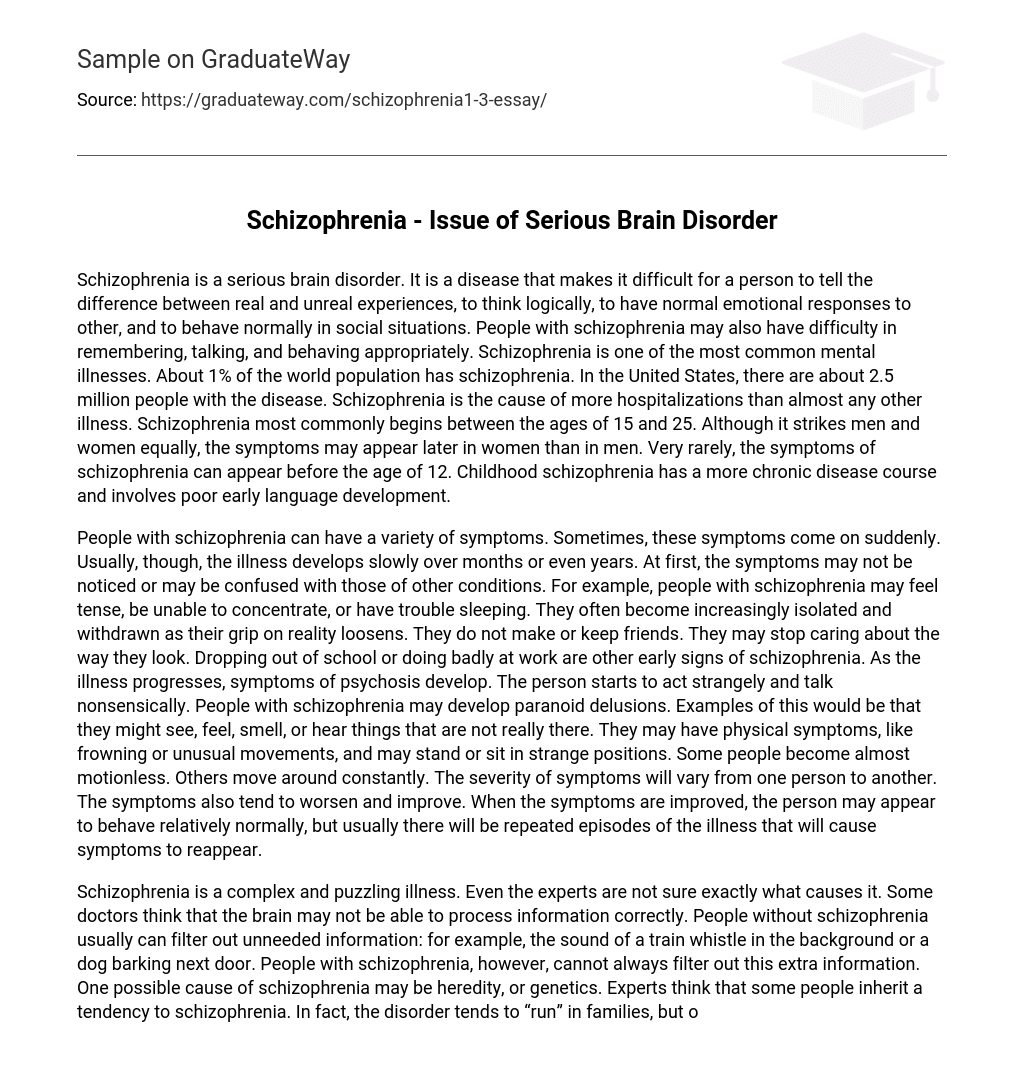Schizophrenia is a severe brain disorder characterized by difficulty distinguishing between real and unreal experiences, impaired logical thinking, abnormal emotional responses, and inappropriate behavior in social situations. It also affects memory, communication, and appropriate behavior. Globally, it is one of the most prevalent mental illnesses, affecting approximately 1% of the world population. In the United States alone, there are around 2.5 million individuals living with schizophrenia, making it a leading cause of hospitalizations. The onset typically occurs between ages 15 and 25 and affects both genders equally; however, women may experience symptoms later. In rare cases, symptoms can appear before age 12 indicating a more chronic disease course along with cognitive delay in childhood schizophrenia.
Schizophrenia can manifest in different forms and may develop gradually over a long period of time, like months or even years. Some symptoms might suddenly appear, while others could be initially overlooked or mistaken for other conditions. People with schizophrenia may experience feelings of tension, difficulty concentrating, or problems with sleep. As their connection to reality weakens, they often become socially isolated and withdraw from personal grooming and interactions. Early signs of the illness include dropping out of school or performing poorly at work. As the illness progresses, individuals may show signs of psychosis, such as peculiar behavior and incoherent speech. Paranoid delusions are common as individuals perceive non-existent qualities through their senses. Physical symptoms like frowning or unusual movements may also occur along with peculiar standing or sitting positions. Some people become motionless while others constantly move around. The severity of symptoms varies among individuals and fluctuates over time. During periods when they improve, affected individuals may seem relatively normal; however, recurring episodes typically cause symptoms to reappear.
Schizophrenia is a complex and mysterious illness with an unknown cause. Some doctors speculate that it may result from the brain’s inability to accurately process information. Typically, individuals without schizophrenia can effectively filter unnecessary stimuli, like background noises or distant sounds. However, those with schizophrenia struggle to differentiate this additional information.
The development of this condition may be influenced by heredity or genetics as it tends to run in families. Even if a child is adopted and raised by mentally healthy parents, having both biological parents with schizophrenia increases the chance of the child developing the disease to nearly 40%. If an identical twin has schizophrenia, the likelihood rises to almost 50%.
Conversely, if the biological parents are mentally healthy but the adoptive parents have schizophrenia, there is only about a 1% chance of the child developing the illness. This risk level aligns with that of the general population in the United States.
According to researchers, certain environmental factors have the potential to trigger schizophrenia in individuals. Research has shown that people who were exposed to influenza infection or had insufficient nutrition during pregnancy, as well as those who experienced birth complications, are more prone to developing schizophrenia later in life. It is widely acknowledged that the disease results from a complex interaction between genetic and environmental factors. While some individuals may be more predisposed to the illness, actually acquiring it depends on exposure to significant stressors or traumas.
Commonly employed treatments for schizophrenia include antipsychotic medication, counseling, and rehabilitation. In some cases, hospitalization may be required during acute episodes to mitigate symptoms and prevent future relapses. It is important to note that there is currently no known cure for this condition.
Since the mid-1950’s, antipsychotic medications have been highly effective in managing symptoms of schizophrenia. They have greatly improved the quality of life for many individuals by allowing them to function in society rather than being confined to overcrowded hospitals. It is important to note that there is no universally superior medication because each person with schizophrenia has a unique combination of symptoms. What may be effective for one individual may not work as well for another. While these medications do not provide a cure, they can help alleviate hallucinations and delusions, enabling individuals to regain their grip on reality. Furthermore, medication plays a role in reducing the risk of symptom recurrence and can also decrease the severity of symptoms during relapses.
Individuals with schizophrenia often encounter difficulties in communication and performing daily tasks. Counseling and rehabilitation are helpful in teaching individuals the necessary skills to function outside of a hospital environment. However, these treatments are not as effective during acute episodes. Rehabilitation programs have the potential to assist those with schizophrenia in acquiring important life skills like managing money, cooking, and taking care of oneself, as well as preparing them for employment or reintegrating into the workforce. Individual psychotherapy helps people with schizophrenia differentiate between reality and delusions. Group therapy improves interpersonal abilities, while self-help groups create a sense of shared experiences among individuals dealing with schizophrenia.
Continuing to take the prescribed medication is crucial in effectively preventing relapses. People with schizophrenia may stop their medication for various reasons, particularly due to side effects. It can be challenging for individuals to tolerate unpleasant side effects for long periods, especially when they feel well. Hence, it is essential to find a medication that effectively manages symptoms without causing undesirable side effects. Convenience also plays a role as certain medications require multiple daily doses while others only need once-daily intake. Additionally, some individuals prefer monthly injections of long-lasting medication. Consistently adhering to the prescribed medication is vital in preventing recurring illness and hospitalization.





